Antes de deslizar para baixo, aperta play no link do Youtube acima para ouvir uma seleção de nossas faixas de Afrobeats favoritas, que inspiraram este artigo.
Música
“Afrobeats” é um gênero relativamente novo musical que vem de Accra, Lagos e Londres. Eu George Howell, junto com Tai Brum ouvimos por acaso outro dia um ‘freestyle’ entre artistas Dotman e Eazi num show de Radio Londrino – Radio 1 Extra “Destination Africa”, que capturou nossa atenção. Afrobeats com um “S” não deve ser confundido com Afrobeat de Fela Kuti. Afrobeats é um som bem moderno e produzido, mais “Beatz” do que “Beats”. Tem aquela pegada chic, com valores de produção alto como os megaproduções de hip hop americano. Os clipes do Youtube são editados com bom gosto, utilizando uma identidade africana, nos cores, lugares e pessoas. No entanto, não estamos falando de uma música que fetichiza a tradição ou uma versão de África arcaica. É jovem e otimista, reforçando uma visão positiva da África. Nem pesado como a ‘Grime’ inglês ou com aquela estética criminosa que os rappers fetichizam. Os músicos usam o patois (giria de rua tipo jamaicano) de Londres, os valores negros occidentais, mas ao mesmo tempo, com uma pegada distintamente africana, e completamente conectada à produção cultural global.
MC Skepta (um estrela de ‘Grime’ de Londres) participando de uma colaboração no Ojuelegba de Wizkid diz na faixa: ” Eu tive que contar minha história porque eles preferem mostrar-lhe crianças negras com moscas em seus rostos na televisão”. Outra estrela Afrobeats da Nigéria, Burnaboy, explicou assim: ” A única coisa que você realmente vê sobre a África é “Ajudar uma criança” ou alguma merda assim, eu só queria ouvir o DMX “.
https://www.instagram.com/p/BWTi69KDGdR/
Os clipes de Afrobeats mostram uma África afluente, a África dos cidades modernas de Lagos e Accra. Gente bonita em roupas de grife, pilotando Mercedes e BMWs. Mansões e clubes de champanhe, mulheres lindas que emanam uma indiferença chique. Um veículo perfeito para combater a concepção da África associados com imagens de crianças com moscas nos olhos. Seguindo outra estrela no Instagram, Mr Eazi, posso ver que ele fez um show em Londres, outro em Houston e as próximas fotos são dele no palco em um estádio em Goma. Goma!: No Republicá Democrático do Congo!? De onde vêm os diamantes de sangue e os Senhores da Guerra? Sim, mas também onde Mr Eazi estava no palco outro dia. Sentimos uma espécie de comunhão com as pessoas de Goma, eles estão gostando dos mesmos sons que nós, em vez de sentir tristeza pelas “pessoas miseráveis” lá com guerra civil e soldados crianças e tal, a música de alguma forma superou isso, criando uma lacuna de empatia e compreensão, abrindo nossos olhos para uma realidade africana mais feliz.
https://www.instagram.com/p/BV_zTZIgrMm/
O mundo conectado em que vivemos permiti que a força cultural africana brilhe. O Instagram e Youtube servem como plataformas e câmeras HD e equipamentos de gravação as ferramentas que democratizaram o acesso de África e seu crescente influência sobre a cultura pop. Na epoca digital, a música africana não precisa de algum tipo de ‘grande explorador branco’, como Peter Gabriel para popularizá-lo. A globalização digital permite que todos se conectem e que artistas africanos possam nos alcançar diretamente. O som Afrobeats ganha espaço, só porque é realmente bom, por puro mérito seu.,
Os africanos não são mais isolados culturalmente. A era digital dá a todos a oportunidade de seguir as tendências globais, todos nós assistimos a Netflix até certo ponto, e todos sabemos quem são os maiores DJs jamaicanos e rappers americanos. Os fabricantes de música Afrobeats da Accra e Lagos, muitas vezes também são de Londres tanto quanto da África, totalmente envolvidos com a “Cultura Global Negro Americanizada”. Por esse termo, consideramos a variedade da cultura pop negra global fortemente influenciada pelos pontos de referência culturais dos Estados Unidos: Beyonce e Jay Z, basquete, a luta negra na América, sendo um “gangsta” por exemplop. A cultura contemporânea africana sempre foi excluída desse discurso. Para os negros nas Américas, África e um lugar que existe na imaginação, uma terra ancestral forçadamente obscurecida dos antepassados, um lugar para talvez também fazer uma peregrinação, mas as coisas que acontece la estão fora de nosso radar. Entretanto, a influência real da cultura africana nas noções de ‘black’ globalizada é mínima. É aludido e imaginado, mas a cultura africana “como está” tem pouco influência cultural. Estamos escrevendo isso no Rio, aqui vejamos pouco envolvimento com o que está acontecendo na África agora, no dia dia.
O surgimento de Afrobeats demonstra que a música de África pulou da seção “World Music“. O Afrobeats e instantaneamente “cool”, não tão erudito como músicas de Cora Maliano ou músicas de Kinshasa, Congo feito por crianças de rua. Afrobeats tem um apelo pop muito mais instantâneo porque se liga diretamente (e espero que começa a exercer uma influência sobre) a cultura popular negra globalizada. Londres desempenha um papel importante porque sinto que informa a música culturalmente, a música para ser respeitada tem que aderir os padrões das boates negras de Londres.
Uma tendência dentro do Afrobeats é a presença de produtores “britânicos negros”, que decidiram abraçar sua africanidade e se envolver com o continente como tal, em vez de imitar apenas estilos americanos ou jamaicanos. Isso é interessante porque esses caras agregam sua influência cosmopolita ao gênero. No dia 23 de julho, por exemplo produtores Afrobeats importantes estavam todos em Londres, Malik Berry, Juls, Team Salut, Legendury Beats e Bayoz Musik estavam no programa Radio 1 Extra “Destination Africa“, falando sobre esse assunto, e vários deles são tanto de lá como da Nigéria ou Gana. O produtor pioneiro Bankuli explicou que o papel importante dos produtores ingleses Afrobeat gosta disso: “É como um vírus, um vírus muito bom … é a África que está no centro das atenções”.
Mr Eazi, de Kumasi, Nigéria, mencionado acima, e um representante importante da nova leva de artistas Afrobeats. Ele diz que não sabe cantar direito e estava estudando engenharia mecânica em Gana antes de se tornar um produtor de eventos que fechou com os melhores músicos do Afrobeats para shows na faculdade. A carreira de cantor começou como um passatempo enquanto ele estava terminando seu mestrado em engenharia em Gana. Ele tem sido um comerciante de ouro e tem uma séria empresa que vende telefones remodelados, ‘Phone Trader’, em Nigeria e está procurando ‘Start Ups’ tecnológicos relevantes para serem lançados na África. Ele está colocando um show de cultura Afrobeats em Londres, trazendo não apenas a música, mas a moda e a cultura ‘Afrobeats’ também para Londres em setembro.
O produtor que fez as melhores musicas do Mr Eazi, Burnaboy e vários outros é produtor, e cantor agora, “Juls”, de Londres e Gana. Ele faz a música como hobby depois de trampo como ‘Investment Banker’ para o Banco Nacional do Gana. Ele é o cara que produz os sons mais legais, e é apenas um hobby! Ele tambem organiza uma revista de moda e cultura da Gana. Eles são da geração de africanos capacitados que fizeram estudos de negócios, e de alguma forma “falam MBA”. Eazi fala sobre métricas, quando convidou o músico Dotman a acompanhá-lo em turnê, ele disse que o escolheu por causa dos seus números. Esses caras, como Puff Daddy, são experientes em negócios, eles não estão brincando. O lema de Eazi é “África para o mundo”, um excelente embaixador para globalizar esse som!
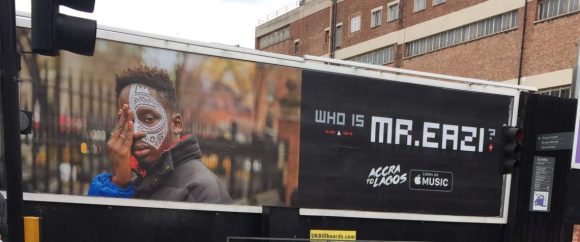
Mr Eazi em Londres
Moda
A moda africana está flexionando seus músculos também, e há de alguma forma uma ressonância com o que está acontecendo com o Afrobeats. A marca de luxo sul-africana Maxhosa usa impressões inspiradas em combinações de cores tribais do povo Xhosa, porem cortadas em um estilo clássico bem francês. O resultado é uma fusão espetacular. O africano como protagonista neste exemplo está usando cortes europeus para modernizar uma estética Xhosa distinta. O designer Laduma Ngxokolo é Xhosa, explica que foi motivado criar roupas de luxo adequado para a cerimônia de iniciação masculina Xhosa, onde os roupas finas estão exigidas. A marca de biquíni B Fyne produz peças maravilhosos, o designer nigeriano Buki Ade foi inspirado pela cultura nigeriana e suas artes indígenas em fazer a coleção.
https://www.instagram.com/p/BWao4UIhTSi/
https://www.instagram.com/p/BUcNodkF5tG/
https://www.instagram.com/p/BUhkQ50h2Cr/
A moda de luxo europeia e americana parece cansada e branda colocado lado a lado com Maxhosa ou B Fyne. As referências culturais da moda ocidental parecem uma mina gastada em comparação com as veias ricas de recursos inexplorados da África. Cultura tribal africana e uma espece de ‘lente africana’ oferecem uma riqueza de inspiração inexplorada.
Arte
A arte contemporânea africana é, em nossa opinião, a melhor do mundo. O trabalho produzido pelos artistas contemporâneos africanos é consistentemente excelente. El Anastui cria grandes tapeçarias régias com tampas de garrafas, Ibrahim Mahama cobriu o Arsenale de Veneza em tecido de juta antigo para um efeito impressionante. O artista sul-africano cobriu um blindado da polícia sul-africano em contas, Nelson Makamo pinta retratos maravilhosos de estilo ‘street art’. O trabalho da artista Serge Clottey da Gana com galões também é realmente poderoso.
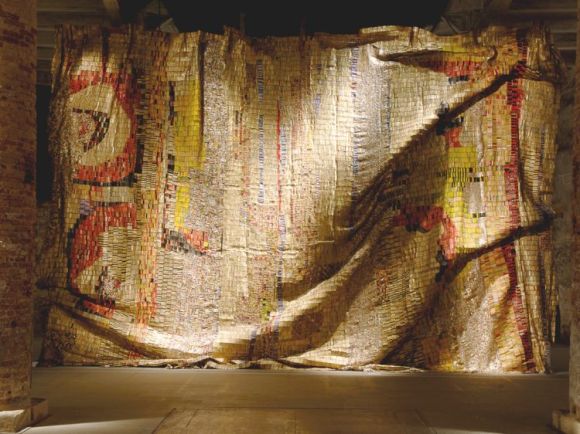
Tampas de garrafa do El Anatsui
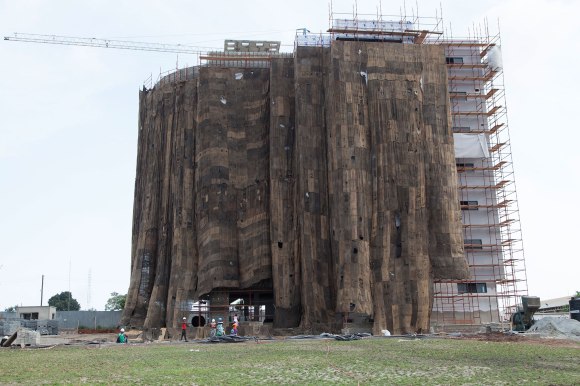
Ibrahim Mahama trabalhando com tecido de juta
https://www.instagram.com/p/BWMCLSwj7bj/
https://www.instagram.com/p/BUJK39wD73n/
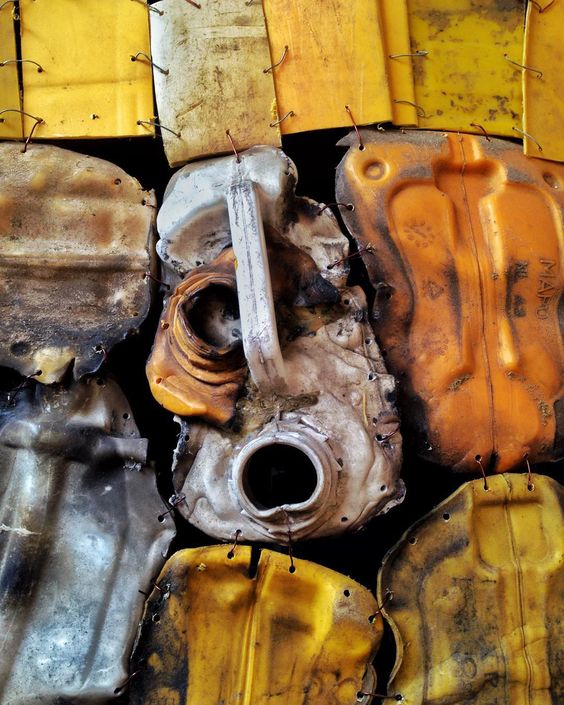
“Afrogallonism” do Serge Attukwei Clottey
A casa antiga de leilões milionários de Londres Bonham’s lançou um serie de leilões “Africa Now“, para vender arte africana contemporânea e moderna para centenas de milhares de libras.
No entanto, a cultura africana ainda é marginalizada. A música da Afrobeats ainda não entrou direito no radar da música “negra”. Semana da moda Lagos e África do Sul estão se tornando mais importantes, mas a moda africana não ameaça a hegemonia de Paris, Milão e Nova York. No mundo da arte contemporânea, há reverência pela arte contemporânea africana, mas de alguma forma esta marginalizado em comparação com a destaque que arte moderna de origem europeia ocupa.
Jack Weatherford argumenta que o renascimento na Europa deve uma enorme dívida ao Império Mongol que permitiu que uma polinização cruzada científica e cultural acontecesse, através de rotas comerciais e a segurança para movimentos de pessoas garantidas pelo império . Isso permitiu uma fusão de conhecimento de regiões distantes.
Estamos de alguma forma à cúspide de um renascimento africano, facilitada pela comunicação instantânea de informações audiovisuais e conexões diásporas com as capitais culturais do mundo.
2018 verá a chegada do super-herói africano Pantera Negra em uma megaprodução da Marvel Studios. Pantera Negra aborda clichês, o super-herói é um príncipe do reino de Wakanda, o país mais rico do mundo com tecnologia super avançada.
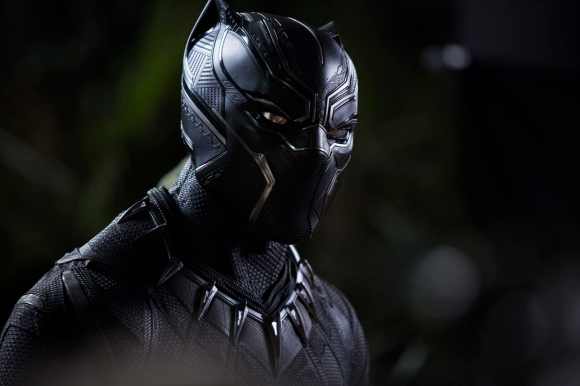
Como a Pantera Negra, os produtores culturais africanos estão interessados em mostrar que a África não é mais o “mundo em desenvolvimento”, mas que chegou. Infundindo a própria música, moda e arte do continente com um engajamento astuto com elementos da modernidade. Isso está apenas começando agora.
Este artigo foi escrito após extensas discussões sobre Afrobeats, Brasil, e o potencial aumento da influência da África entre George Howell e estilista brasileira Tai Brum. Vivemos no Rio de Janeiro e estamos trabalhando para ter mais Afrobeats e influência cultural africana aqui.
24 de agusto de 2017